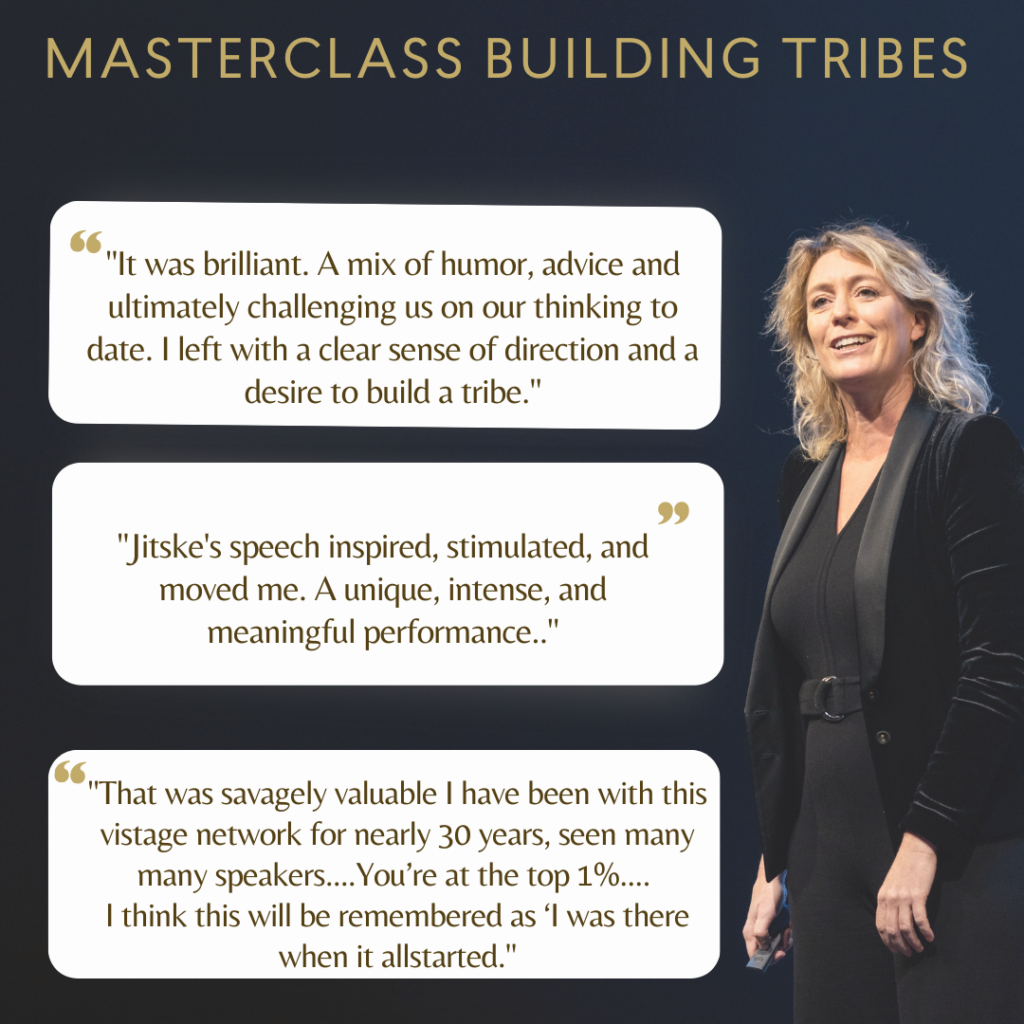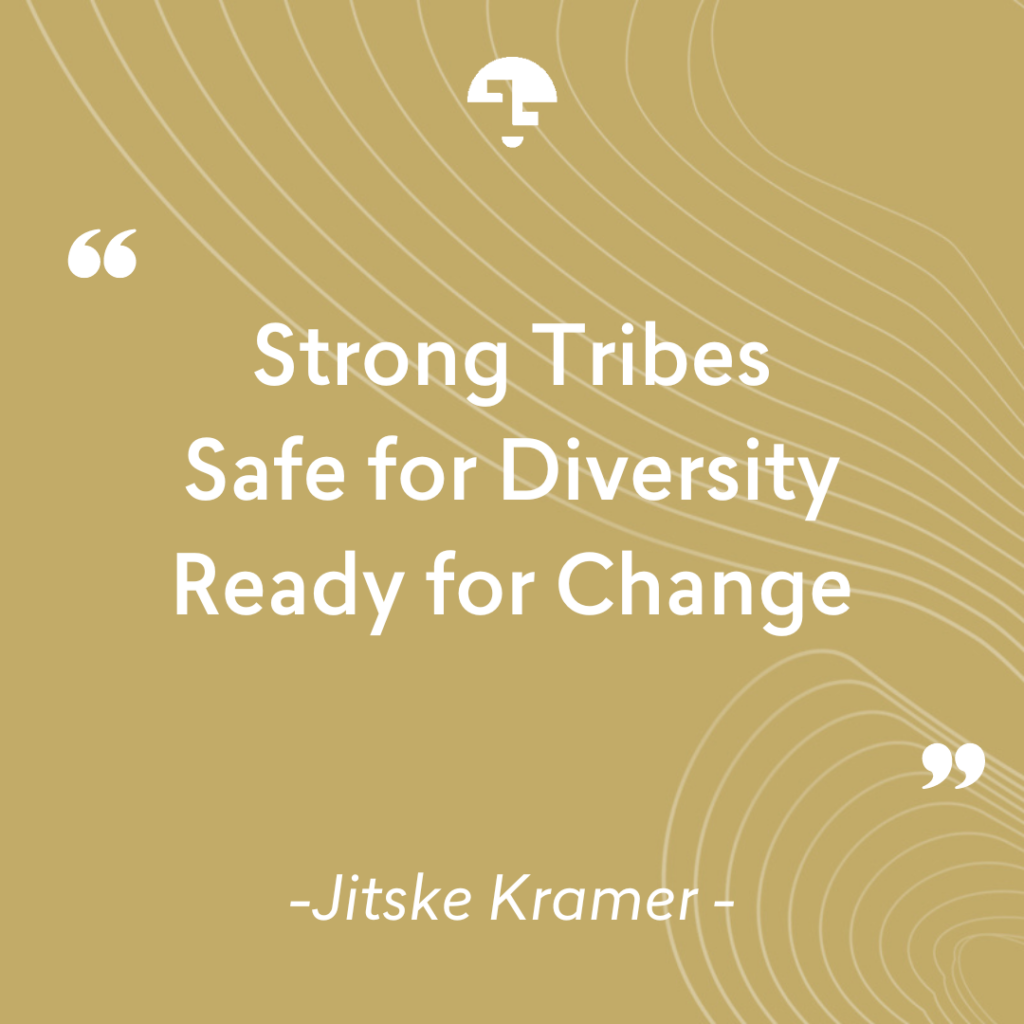CRACK THE CULTURE CODE
Organizational cultures and culture change
from an anthropological perspective.
Based on the books The Corporate Tribe and Building Tribes, the inspiring speaker Jitske Kramer takes you on a fascinating journey. She talks about how people shape cultures and how cultures shape people. Full of beautiful stories and anthropological lessons about people, culture, change and leadership. About the interplay of Power & Love and the importance of good interaction and decision-making.
With efficient bullet point meetings and human campfire conversations. Anthropological insights to create and maintain strong and healthy organizations. Challenge yourself to consider how your secret tribal delights about cooperation and leadership fit in today’s modern open organizations.
Have you ever looked at your organization as a tribe?
Jitske has. An organization is a living entity, with village squares and town halls (meeting rooms), alleyways and taverns where the real dialogue takes place (smoking areas and coffee corners). With chiefs (leaders), elders (regulatory bodies), hunters (sales), magicians (IT, HR, change managers, consultants) and gatherers (the fee earners). To truly understand the ins and outs of a tribe and to guide the so-called intangible organization culture, it is important to understand how people shape cultures.
Less group stupidity and more team intelligence. Every group, organization, society consists of people. And every minute the relationships between these people, the circumstances, the interests and aspirations change. An important theme for Jitske is the high degree of group stupidity that we see in many teams and organisations. How is it possible that in itself reasonable intelligence people as a group so often get stuck in collective inability? All this stupidity costs society, the organization and everyone involved a lot of frustration and tons of money. Through travel stories and her experiences in different cultures and communities, Jitske shows how we can improve our mutual relationships, so that we as a group become smarter in our thinking and acting. Strong organizational cultures have group norms that promote team intelligence.
Good conversations, better conflicts and the best decisions. Imagine that at the start of a strategic process, we didn’t say ‘I hope we can quickly reach an agreement.’ But instead: ‘how amazing it is to be here together with so many people, with so many different views, opinions and networks. With such diversity. Let’s use our collective wisdom, backgrounds and knowledge to the best of our abilities.’ What great things we might achieve together… But how to do this? How do we ensure that it is not always the same few people who talk during a management meeting? People shape cultures through interaction and decision-making. It is important to optimise these processes. How? We can learn a lot from different cultures. The Lekgotla in Botswana, the silent meetings of the Quakers, Deep Democracy developed by Myrna Lewis in South-Africa. When the focus of this talk needs to be on ‘tribes and decsion-making’, Jitske Kramer will include these stories and insights.
Culture means different things to different people.
Culture is a vital driving force at every level of your organisation—and it’s where corporate culture expert Jitske Kramer thrives. In this revealing and uplifting presentation, anthropologist Jitske Kramer draws on her bestselling and award winning books, “The Corporate Tribe” and “Building Tribes,” to share inspiring stories and anthropological lessons about people, culture, change and leadership. Taking an anthropological lens, she explores the subtle dynamics that shape decisions and interactions—at the heart of how humans work. People are wired to build tribes. We live in groups, believe in stories, create hierarchies, and operate within complex systems of give and take. In other words: we build structures to bring order to the chaos of everyday life—including at work.
Everything we do in organizations is culture. And culture doesn’t fall from the sky – it’s created. Understanding that gives us the power to intentionally shape how we work, lead, and live together. This vibrant, interactive session is built around one core message: People shape Cultures and Cultures shape People. Guided by one powerful question: how do we build strong organizations, that connect where possible, fight when necessary, heal when needed and say goodbye when there is no other way?
In this session, we explore what it really takes to build resilient cultures in times of change. We’ll discover that we need to move beyond transactional interactions – into transformational ones. Campfire conversations held with power and love. Because culture doesn’t thrive on policies or bullet points. It thrives on real raw and courageous conversations,
Depending on time and preferences, this talk can be enriched with stunning visuals and short film clips from Kramer’s travels to remote communities – from the African desert and the Asian jungle to the peculiar world of Las Vegas.
Focus: Understanding and influencing organisational culture through an anthropological lens
What makes this talk unique: Brings workplace culture to life with global stories and sharp insights into group dynamics, rituals and unwritten rules


video's CRACK THE CULTURE CODE
jitske at nwx21
hamburg
organizations as
purpose driven tribes
crack the culture code
building a future proof corporate culture
Keynote Building Tribes: custom made
How can we make work more human? Aftermovie Work Human Live Forum London
The whole field of corporate anthropology is too much to cover in one keynote. After an introduction on how people form tribes and cultures, we will choose a focus. During the intake session over the phone, we coordinate your needs and possibilities within the available time.
This can include the following:
- Implementing cultural change. Cultures are constantly and always changing. And yet, most scheduled cultural processes fail miserably. They won’t fail if you apply the knowledge and skills of anthropology. Direct the cultural change in such a way that new behavior will spread through the organization like wildfire.
- Tribes and decision-making. Cultures are shaped in interaction and decision-making. Therefore, it is essential to do this properly. About the necessary force of power and love. About the impact of different types of interaction and decision-making. About autocratic and directive leadership and shared and inclusive leadership. About the archetypal tribal roles that are necessary to shape a strong organization culture and to change it. About inclusive cultures. We combine insights from Deep Democracy and Jam Cultures. You will learn about the difference between round and square meetings. With examples of types of dialogue from all over the world.
- Leadership in the meantime. Changes leads to chaos. Transformation entails a period in which the old is gone, and the new isn’t here yet. Anthropologists call this stage liminality: the middle stage. This calls for two types of leadership. Regular leadership should be properly executed: solving conflicts, organizing things, setting up frameworks and structures. That is the role of the chief. And we also distinguish extraordinary liminal leadership: bringing new order to the chaos, establishing the new normal. That is the role of the mage.
- Cooperation between departments, with partners. Tribal Connections. No single organization, no single tribe, exists in a vacuum. There are always other tribes to work with, to sell things to, to take into account, to compete with. Sometimes this is a peaceful process and sometime it’s tough going. We can enter into an intense bond through profound trade relations and intermarriage. In this keynote, we travel the world to learn how people work with other tribes. Anthropological lessons that you can directly apply to your own network of relationships, chain cooperation and co-creation associations.
- The power of rituals. Rituals help people live with uncertainty. Help them make transitions. With anthropological knowledge of the meaning and structure of rituals, you can easily create these yourself for your organization or team.
- Anthropological culture study. Anthropologists know where to look in order to understand a culture. And the best way to do that. This includes participant observation, a way of observing and interviewing people to understand them better within their context. This enables you to learn to really recognize cultural patterns, after which you can decide what you want to keep and what you want to part with.
Whoever hasn’t jumped on the band wagon of agile, self-management, participation processes, shared leadership, self-organization, swarms, co-creation, inclusion, cross-chain partnerships… is running far behind. Or so it appears. It seems as if we have to entirely reinvent ourselves, and our leadership. Jitske believes that is only partially true. Because humanity has centuries of experience in working together, living together, conferring, making decisions and changing. We can draw from that experience. Looking through the anthropological lens, you will see in clearer focus what is really happening in the dynamics of the organization. Like switching from black-and-white to color TV.
Oslo Business Forum wrote an article about Jitske’s Keynote Building Tribes during the Purpose Driven Leadership Seminar. Curious? You can read the article here.
At Workhuman Live Forum in London, Jitske spoke alongside Amy Edmondson, Dr. Meisha-Ann Martin, David Green, and Holly Ransom, sharing how an anthropological lens on workplace culture can unlock behaviour change and boost business impact.

